Globalization of Accounting Standards: Preventing Corporate Collapses
VerifiedAdded on 2023/04/25
|13
|3566
|430
Essay
AI Summary
This essay discusses the globalization of accounting rules and its importance in preventing future corporate collapses. It contrasts rule-based (GAAP) and principle-based (IFRS) accounting regulations, highlighting the international dimensions of accounting and the move towards comparative accounting. The essay explores how harmonizing accounting standards can prevent corporate failures like Enron by addressing issues in financial reporting and revenue recognition. It also acknowledges the challenges in globalizing accounting standards, particularly in developing nations, and emphasizes the need for regulatory infrastructure to combat secrecy and fraud. The study emphasizes the importance of SEC to avoid financial recognition issues.
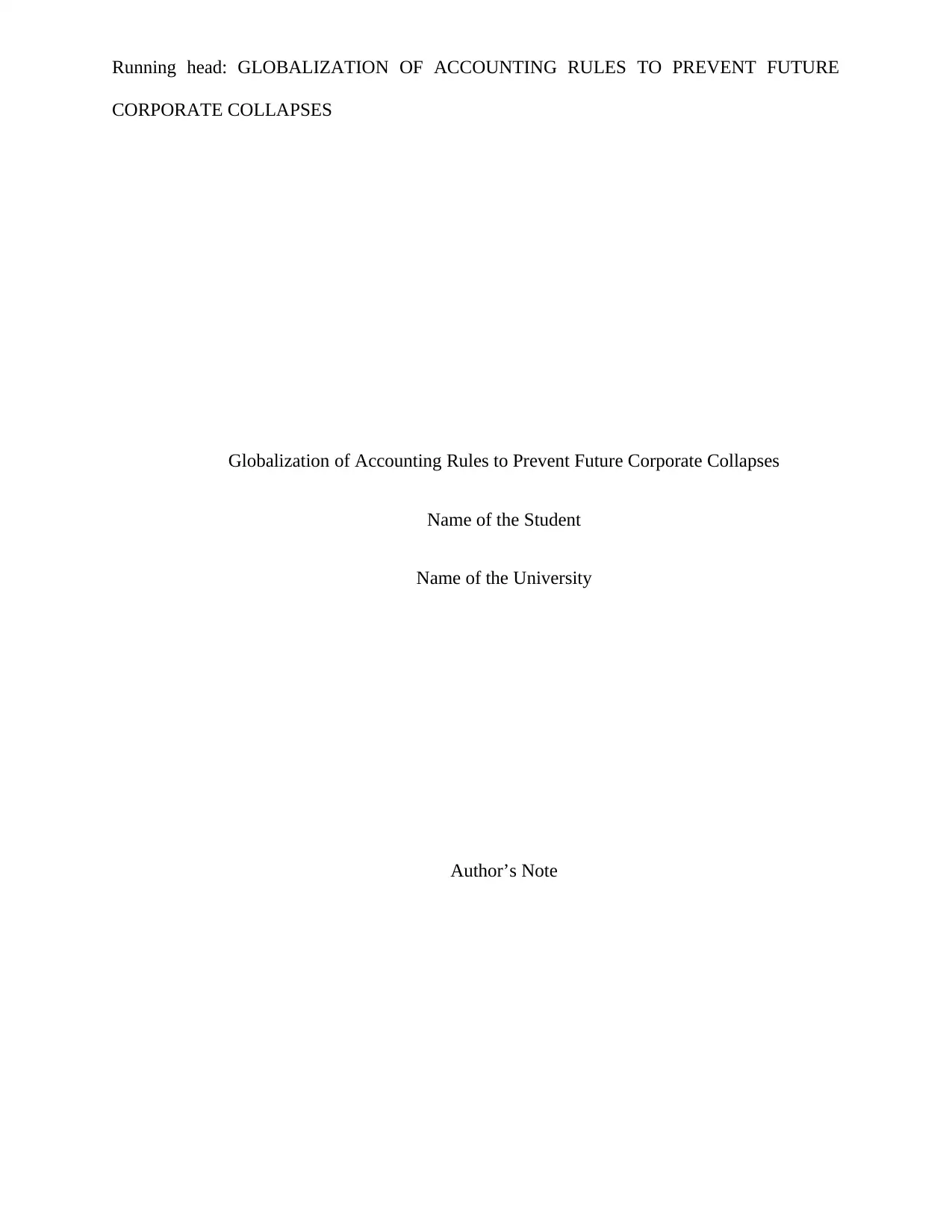
Running head: GLOBALIZATION OF ACCOUNTING RULES TO PREVENT FUTURE
CORPORATE COLLAPSES
Globalization of Accounting Rules to Prevent Future Corporate Collapses
Name of the Student
Name of the University
Author’s Note
CORPORATE COLLAPSES
Globalization of Accounting Rules to Prevent Future Corporate Collapses
Name of the Student
Name of the University
Author’s Note
Paraphrase This Document
Need a fresh take? Get an instant paraphrase of this document with our AI Paraphraser
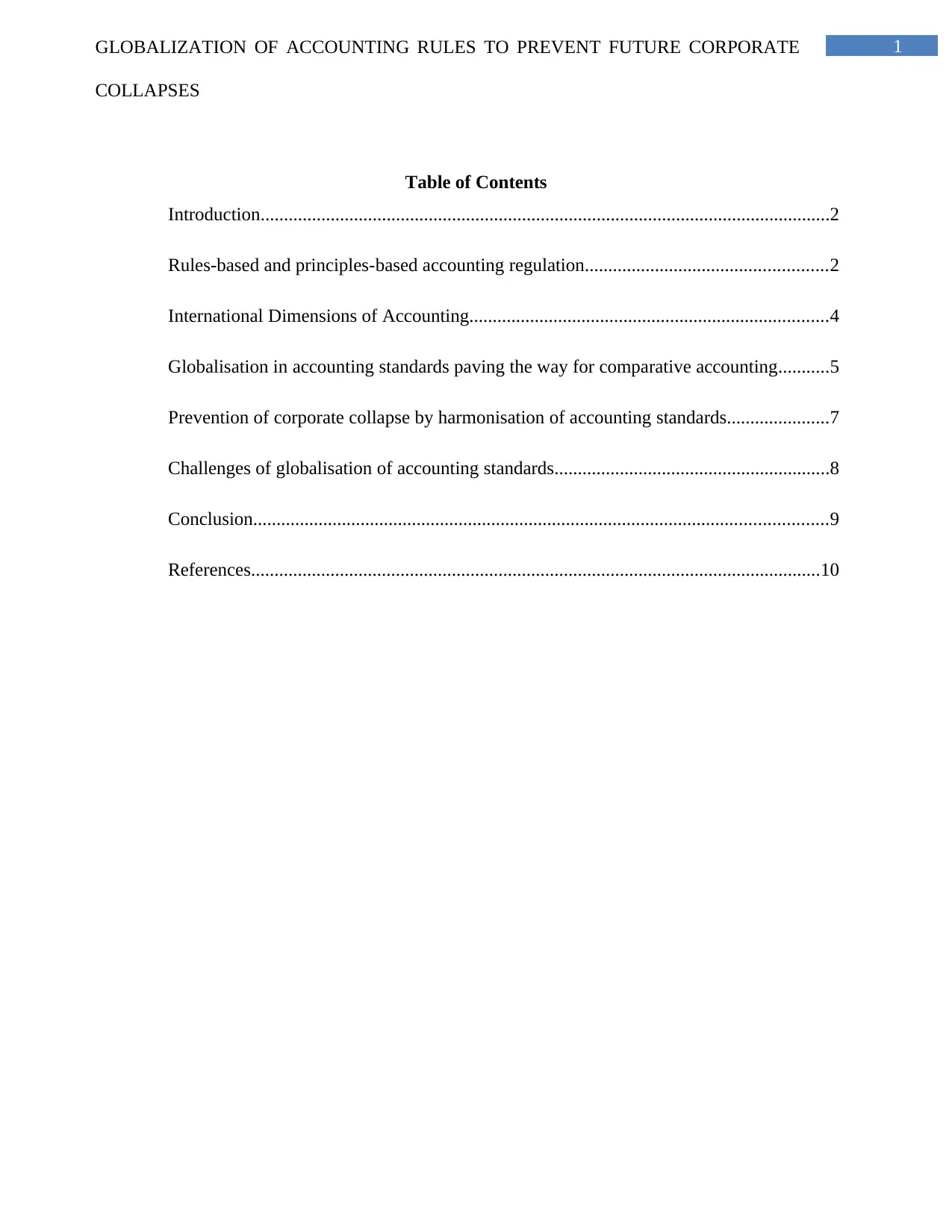
1GLOBALIZATION OF ACCOUNTING RULES TO PREVENT FUTURE CORPORATE
COLLAPSES
Table of Contents
Introduction..........................................................................................................................2
Rules-based and principles-based accounting regulation....................................................2
International Dimensions of Accounting.............................................................................4
Globalisation in accounting standards paving the way for comparative accounting...........5
Prevention of corporate collapse by harmonisation of accounting standards......................7
Challenges of globalisation of accounting standards...........................................................8
Conclusion...........................................................................................................................9
References..........................................................................................................................10
COLLAPSES
Table of Contents
Introduction..........................................................................................................................2
Rules-based and principles-based accounting regulation....................................................2
International Dimensions of Accounting.............................................................................4
Globalisation in accounting standards paving the way for comparative accounting...........5
Prevention of corporate collapse by harmonisation of accounting standards......................7
Challenges of globalisation of accounting standards...........................................................8
Conclusion...........................................................................................................................9
References..........................................................................................................................10
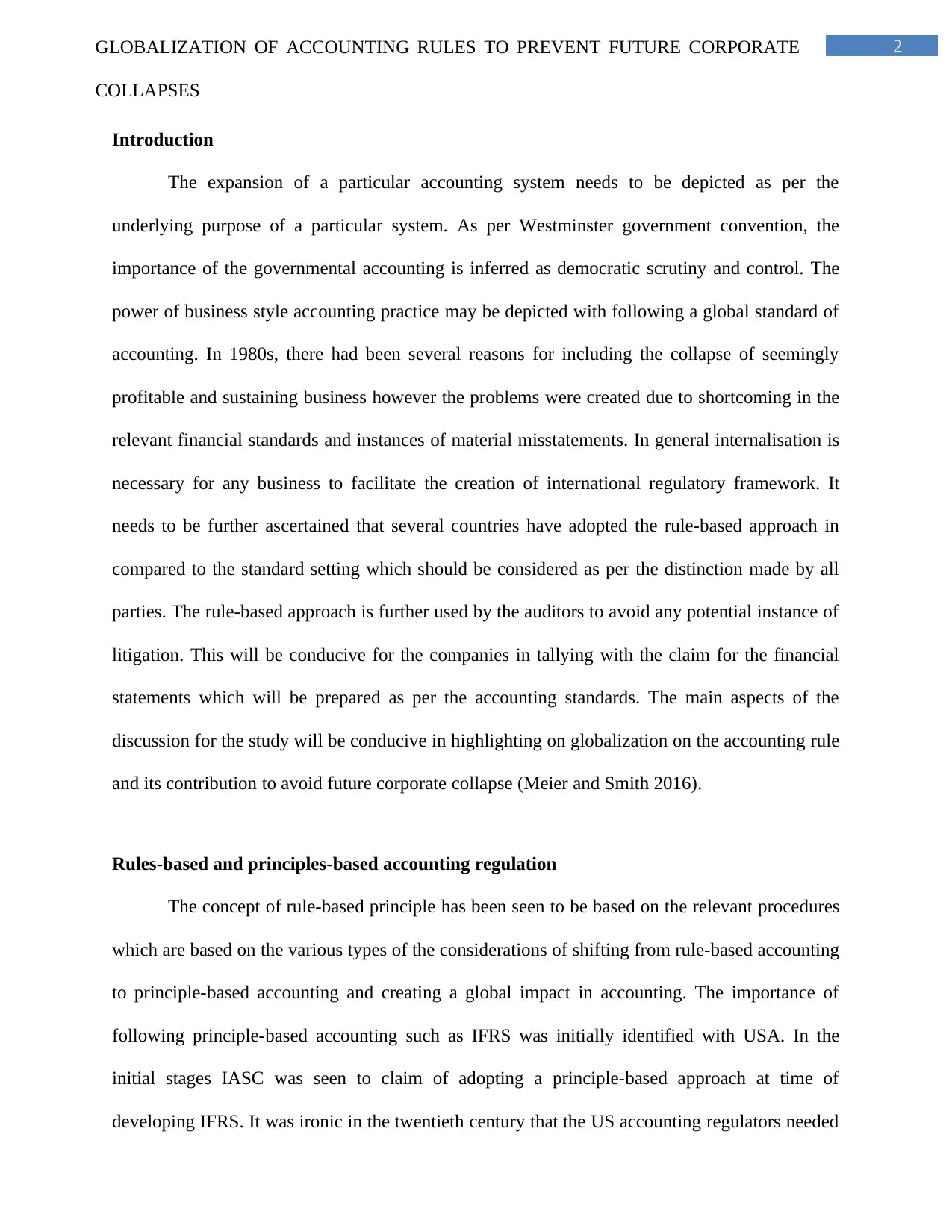
2GLOBALIZATION OF ACCOUNTING RULES TO PREVENT FUTURE CORPORATE
COLLAPSES
Introduction
The expansion of a particular accounting system needs to be depicted as per the
underlying purpose of a particular system. As per Westminster government convention, the
importance of the governmental accounting is inferred as democratic scrutiny and control. The
power of business style accounting practice may be depicted with following a global standard of
accounting. In 1980s, there had been several reasons for including the collapse of seemingly
profitable and sustaining business however the problems were created due to shortcoming in the
relevant financial standards and instances of material misstatements. In general internalisation is
necessary for any business to facilitate the creation of international regulatory framework. It
needs to be further ascertained that several countries have adopted the rule-based approach in
compared to the standard setting which should be considered as per the distinction made by all
parties. The rule-based approach is further used by the auditors to avoid any potential instance of
litigation. This will be conducive for the companies in tallying with the claim for the financial
statements which will be prepared as per the accounting standards. The main aspects of the
discussion for the study will be conducive in highlighting on globalization on the accounting rule
and its contribution to avoid future corporate collapse (Meier and Smith 2016).
Rules-based and principles-based accounting regulation
The concept of rule-based principle has been seen to be based on the relevant procedures
which are based on the various types of the considerations of shifting from rule-based accounting
to principle-based accounting and creating a global impact in accounting. The importance of
following principle-based accounting such as IFRS was initially identified with USA. In the
initial stages IASC was seen to claim of adopting a principle-based approach at time of
developing IFRS. It was ironic in the twentieth century that the US accounting regulators needed
COLLAPSES
Introduction
The expansion of a particular accounting system needs to be depicted as per the
underlying purpose of a particular system. As per Westminster government convention, the
importance of the governmental accounting is inferred as democratic scrutiny and control. The
power of business style accounting practice may be depicted with following a global standard of
accounting. In 1980s, there had been several reasons for including the collapse of seemingly
profitable and sustaining business however the problems were created due to shortcoming in the
relevant financial standards and instances of material misstatements. In general internalisation is
necessary for any business to facilitate the creation of international regulatory framework. It
needs to be further ascertained that several countries have adopted the rule-based approach in
compared to the standard setting which should be considered as per the distinction made by all
parties. The rule-based approach is further used by the auditors to avoid any potential instance of
litigation. This will be conducive for the companies in tallying with the claim for the financial
statements which will be prepared as per the accounting standards. The main aspects of the
discussion for the study will be conducive in highlighting on globalization on the accounting rule
and its contribution to avoid future corporate collapse (Meier and Smith 2016).
Rules-based and principles-based accounting regulation
The concept of rule-based principle has been seen to be based on the relevant procedures
which are based on the various types of the considerations of shifting from rule-based accounting
to principle-based accounting and creating a global impact in accounting. The importance of
following principle-based accounting such as IFRS was initially identified with USA. In the
initial stages IASC was seen to claim of adopting a principle-based approach at time of
developing IFRS. It was ironic in the twentieth century that the US accounting regulators needed
⊘ This is a preview!⊘
Do you want full access?
Subscribe today to unlock all pages.

Trusted by 1+ million students worldwide
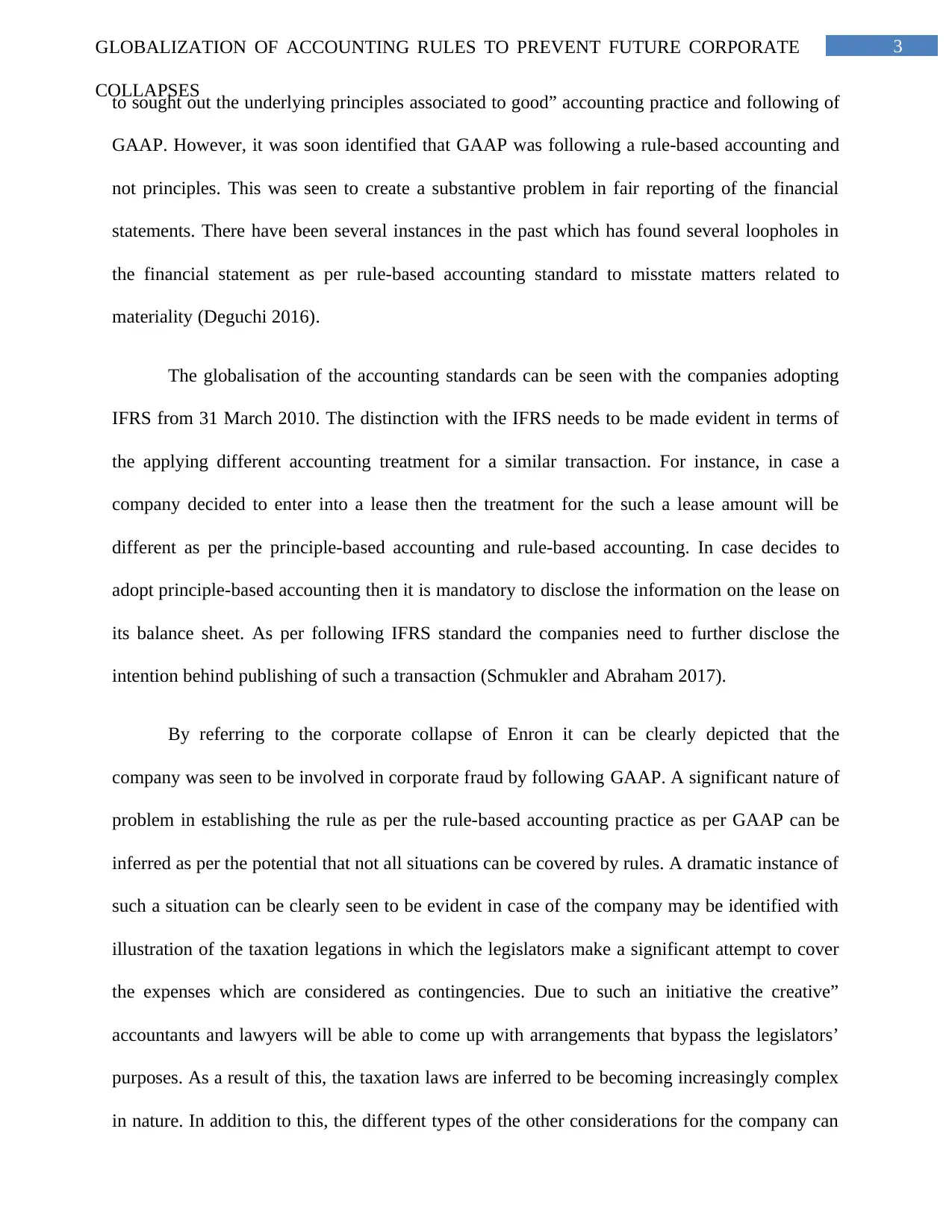
3GLOBALIZATION OF ACCOUNTING RULES TO PREVENT FUTURE CORPORATE
COLLAPSES
to sought out the underlying principles associated to good” accounting practice and following of
GAAP. However, it was soon identified that GAAP was following a rule-based accounting and
not principles. This was seen to create a substantive problem in fair reporting of the financial
statements. There have been several instances in the past which has found several loopholes in
the financial statement as per rule-based accounting standard to misstate matters related to
materiality (Deguchi 2016).
The globalisation of the accounting standards can be seen with the companies adopting
IFRS from 31 March 2010. The distinction with the IFRS needs to be made evident in terms of
the applying different accounting treatment for a similar transaction. For instance, in case a
company decided to enter into a lease then the treatment for the such a lease amount will be
different as per the principle-based accounting and rule-based accounting. In case decides to
adopt principle-based accounting then it is mandatory to disclose the information on the lease on
its balance sheet. As per following IFRS standard the companies need to further disclose the
intention behind publishing of such a transaction (Schmukler and Abraham 2017).
By referring to the corporate collapse of Enron it can be clearly depicted that the
company was seen to be involved in corporate fraud by following GAAP. A significant nature of
problem in establishing the rule as per the rule-based accounting practice as per GAAP can be
inferred as per the potential that not all situations can be covered by rules. A dramatic instance of
such a situation can be clearly seen to be evident in case of the company may be identified with
illustration of the taxation legations in which the legislators make a significant attempt to cover
the expenses which are considered as contingencies. Due to such an initiative the creative”
accountants and lawyers will be able to come up with arrangements that bypass the legislators’
purposes. As a result of this, the taxation laws are inferred to be becoming increasingly complex
in nature. In addition to this, the different types of the other considerations for the company can
COLLAPSES
to sought out the underlying principles associated to good” accounting practice and following of
GAAP. However, it was soon identified that GAAP was following a rule-based accounting and
not principles. This was seen to create a substantive problem in fair reporting of the financial
statements. There have been several instances in the past which has found several loopholes in
the financial statement as per rule-based accounting standard to misstate matters related to
materiality (Deguchi 2016).
The globalisation of the accounting standards can be seen with the companies adopting
IFRS from 31 March 2010. The distinction with the IFRS needs to be made evident in terms of
the applying different accounting treatment for a similar transaction. For instance, in case a
company decided to enter into a lease then the treatment for the such a lease amount will be
different as per the principle-based accounting and rule-based accounting. In case decides to
adopt principle-based accounting then it is mandatory to disclose the information on the lease on
its balance sheet. As per following IFRS standard the companies need to further disclose the
intention behind publishing of such a transaction (Schmukler and Abraham 2017).
By referring to the corporate collapse of Enron it can be clearly depicted that the
company was seen to be involved in corporate fraud by following GAAP. A significant nature of
problem in establishing the rule as per the rule-based accounting practice as per GAAP can be
inferred as per the potential that not all situations can be covered by rules. A dramatic instance of
such a situation can be clearly seen to be evident in case of the company may be identified with
illustration of the taxation legations in which the legislators make a significant attempt to cover
the expenses which are considered as contingencies. Due to such an initiative the creative”
accountants and lawyers will be able to come up with arrangements that bypass the legislators’
purposes. As a result of this, the taxation laws are inferred to be becoming increasingly complex
in nature. In addition to this, the different types of the other considerations for the company can
Paraphrase This Document
Need a fresh take? Get an instant paraphrase of this document with our AI Paraphraser
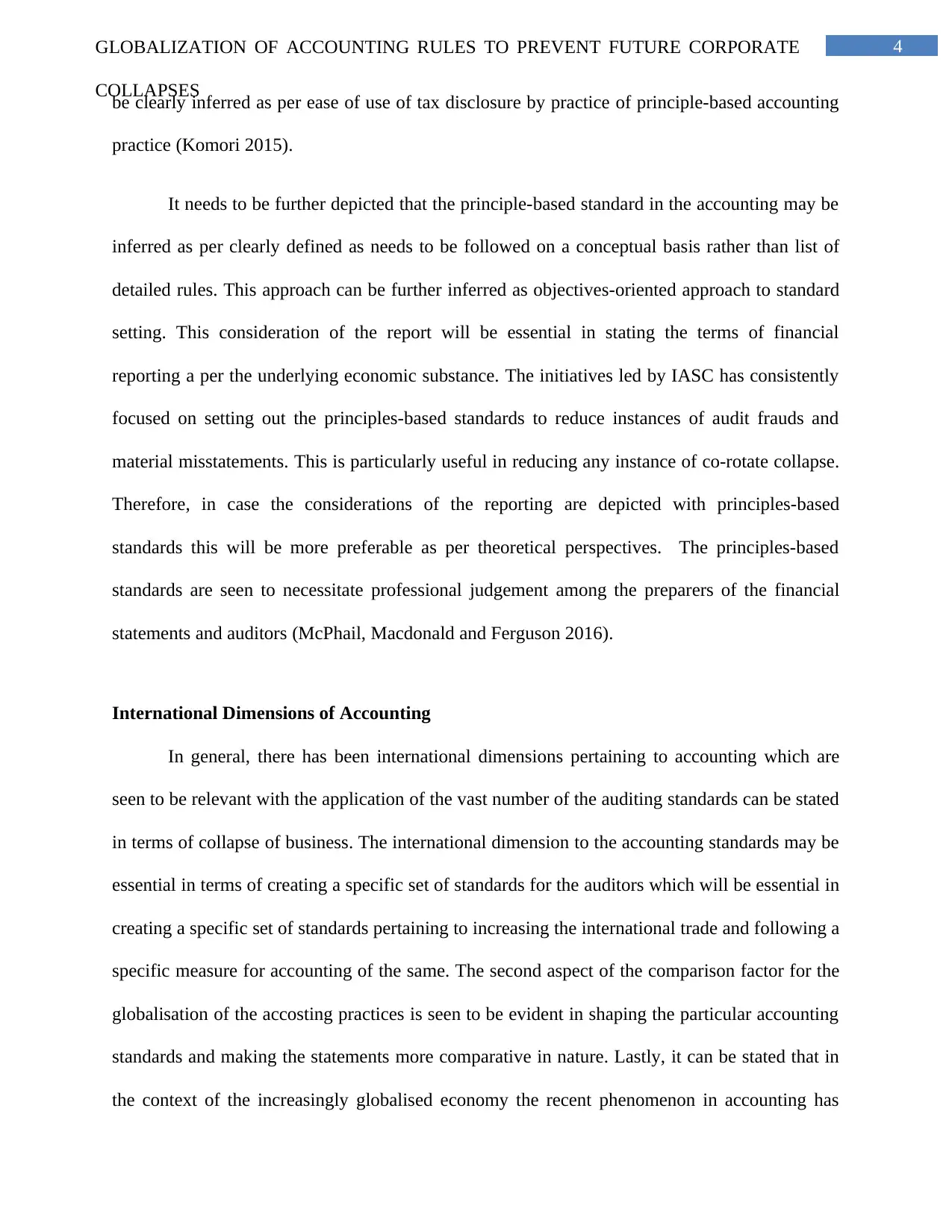
4GLOBALIZATION OF ACCOUNTING RULES TO PREVENT FUTURE CORPORATE
COLLAPSES
be clearly inferred as per ease of use of tax disclosure by practice of principle-based accounting
practice (Komori 2015).
It needs to be further depicted that the principle-based standard in the accounting may be
inferred as per clearly defined as needs to be followed on a conceptual basis rather than list of
detailed rules. This approach can be further inferred as objectives-oriented approach to standard
setting. This consideration of the report will be essential in stating the terms of financial
reporting a per the underlying economic substance. The initiatives led by IASC has consistently
focused on setting out the principles-based standards to reduce instances of audit frauds and
material misstatements. This is particularly useful in reducing any instance of co-rotate collapse.
Therefore, in case the considerations of the reporting are depicted with principles-based
standards this will be more preferable as per theoretical perspectives. The principles-based
standards are seen to necessitate professional judgement among the preparers of the financial
statements and auditors (McPhail, Macdonald and Ferguson 2016).
International Dimensions of Accounting
In general, there has been international dimensions pertaining to accounting which are
seen to be relevant with the application of the vast number of the auditing standards can be stated
in terms of collapse of business. The international dimension to the accounting standards may be
essential in terms of creating a specific set of standards for the auditors which will be essential in
creating a specific set of standards pertaining to increasing the international trade and following a
specific measure for accounting of the same. The second aspect of the comparison factor for the
globalisation of the accosting practices is seen to be evident in shaping the particular accounting
standards and making the statements more comparative in nature. Lastly, it can be stated that in
the context of the increasingly globalised economy the recent phenomenon in accounting has
COLLAPSES
be clearly inferred as per ease of use of tax disclosure by practice of principle-based accounting
practice (Komori 2015).
It needs to be further depicted that the principle-based standard in the accounting may be
inferred as per clearly defined as needs to be followed on a conceptual basis rather than list of
detailed rules. This approach can be further inferred as objectives-oriented approach to standard
setting. This consideration of the report will be essential in stating the terms of financial
reporting a per the underlying economic substance. The initiatives led by IASC has consistently
focused on setting out the principles-based standards to reduce instances of audit frauds and
material misstatements. This is particularly useful in reducing any instance of co-rotate collapse.
Therefore, in case the considerations of the reporting are depicted with principles-based
standards this will be more preferable as per theoretical perspectives. The principles-based
standards are seen to necessitate professional judgement among the preparers of the financial
statements and auditors (McPhail, Macdonald and Ferguson 2016).
International Dimensions of Accounting
In general, there has been international dimensions pertaining to accounting which are
seen to be relevant with the application of the vast number of the auditing standards can be stated
in terms of collapse of business. The international dimension to the accounting standards may be
essential in terms of creating a specific set of standards for the auditors which will be essential in
creating a specific set of standards pertaining to increasing the international trade and following a
specific measure for accounting of the same. The second aspect of the comparison factor for the
globalisation of the accosting practices is seen to be evident in shaping the particular accounting
standards and making the statements more comparative in nature. Lastly, it can be stated that in
the context of the increasingly globalised economy the recent phenomenon in accounting has
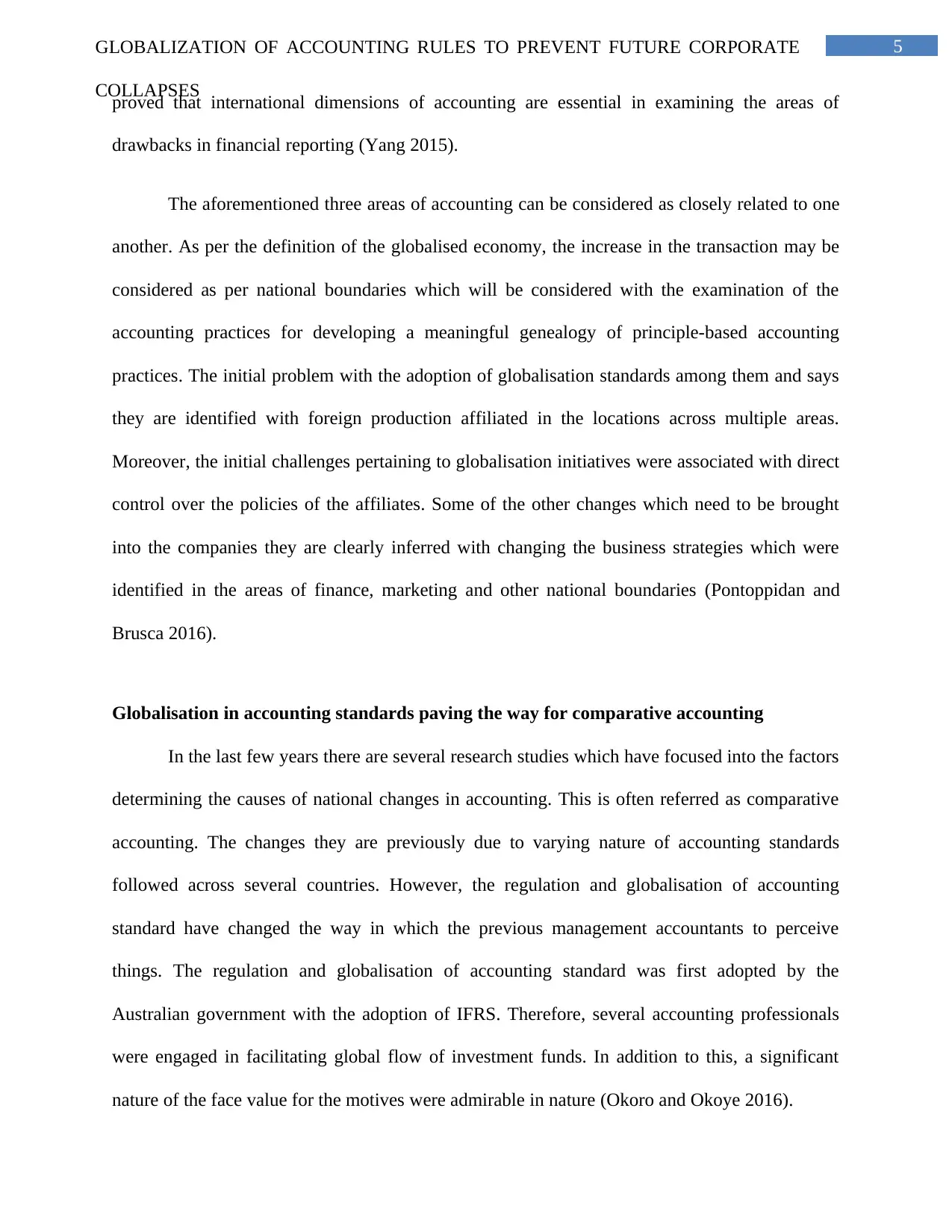
5GLOBALIZATION OF ACCOUNTING RULES TO PREVENT FUTURE CORPORATE
COLLAPSES
proved that international dimensions of accounting are essential in examining the areas of
drawbacks in financial reporting (Yang 2015).
The aforementioned three areas of accounting can be considered as closely related to one
another. As per the definition of the globalised economy, the increase in the transaction may be
considered as per national boundaries which will be considered with the examination of the
accounting practices for developing a meaningful genealogy of principle-based accounting
practices. The initial problem with the adoption of globalisation standards among them and says
they are identified with foreign production affiliated in the locations across multiple areas.
Moreover, the initial challenges pertaining to globalisation initiatives were associated with direct
control over the policies of the affiliates. Some of the other changes which need to be brought
into the companies they are clearly inferred with changing the business strategies which were
identified in the areas of finance, marketing and other national boundaries (Pontoppidan and
Brusca 2016).
Globalisation in accounting standards paving the way for comparative accounting
In the last few years there are several research studies which have focused into the factors
determining the causes of national changes in accounting. This is often referred as comparative
accounting. The changes they are previously due to varying nature of accounting standards
followed across several countries. However, the regulation and globalisation of accounting
standard have changed the way in which the previous management accountants to perceive
things. The regulation and globalisation of accounting standard was first adopted by the
Australian government with the adoption of IFRS. Therefore, several accounting professionals
were engaged in facilitating global flow of investment funds. In addition to this, a significant
nature of the face value for the motives were admirable in nature (Okoro and Okoye 2016).
COLLAPSES
proved that international dimensions of accounting are essential in examining the areas of
drawbacks in financial reporting (Yang 2015).
The aforementioned three areas of accounting can be considered as closely related to one
another. As per the definition of the globalised economy, the increase in the transaction may be
considered as per national boundaries which will be considered with the examination of the
accounting practices for developing a meaningful genealogy of principle-based accounting
practices. The initial problem with the adoption of globalisation standards among them and says
they are identified with foreign production affiliated in the locations across multiple areas.
Moreover, the initial challenges pertaining to globalisation initiatives were associated with direct
control over the policies of the affiliates. Some of the other changes which need to be brought
into the companies they are clearly inferred with changing the business strategies which were
identified in the areas of finance, marketing and other national boundaries (Pontoppidan and
Brusca 2016).
Globalisation in accounting standards paving the way for comparative accounting
In the last few years there are several research studies which have focused into the factors
determining the causes of national changes in accounting. This is often referred as comparative
accounting. The changes they are previously due to varying nature of accounting standards
followed across several countries. However, the regulation and globalisation of accounting
standard have changed the way in which the previous management accountants to perceive
things. The regulation and globalisation of accounting standard was first adopted by the
Australian government with the adoption of IFRS. Therefore, several accounting professionals
were engaged in facilitating global flow of investment funds. In addition to this, a significant
nature of the face value for the motives were admirable in nature (Okoro and Okoye 2016).
⊘ This is a preview!⊘
Do you want full access?
Subscribe today to unlock all pages.

Trusted by 1+ million students worldwide
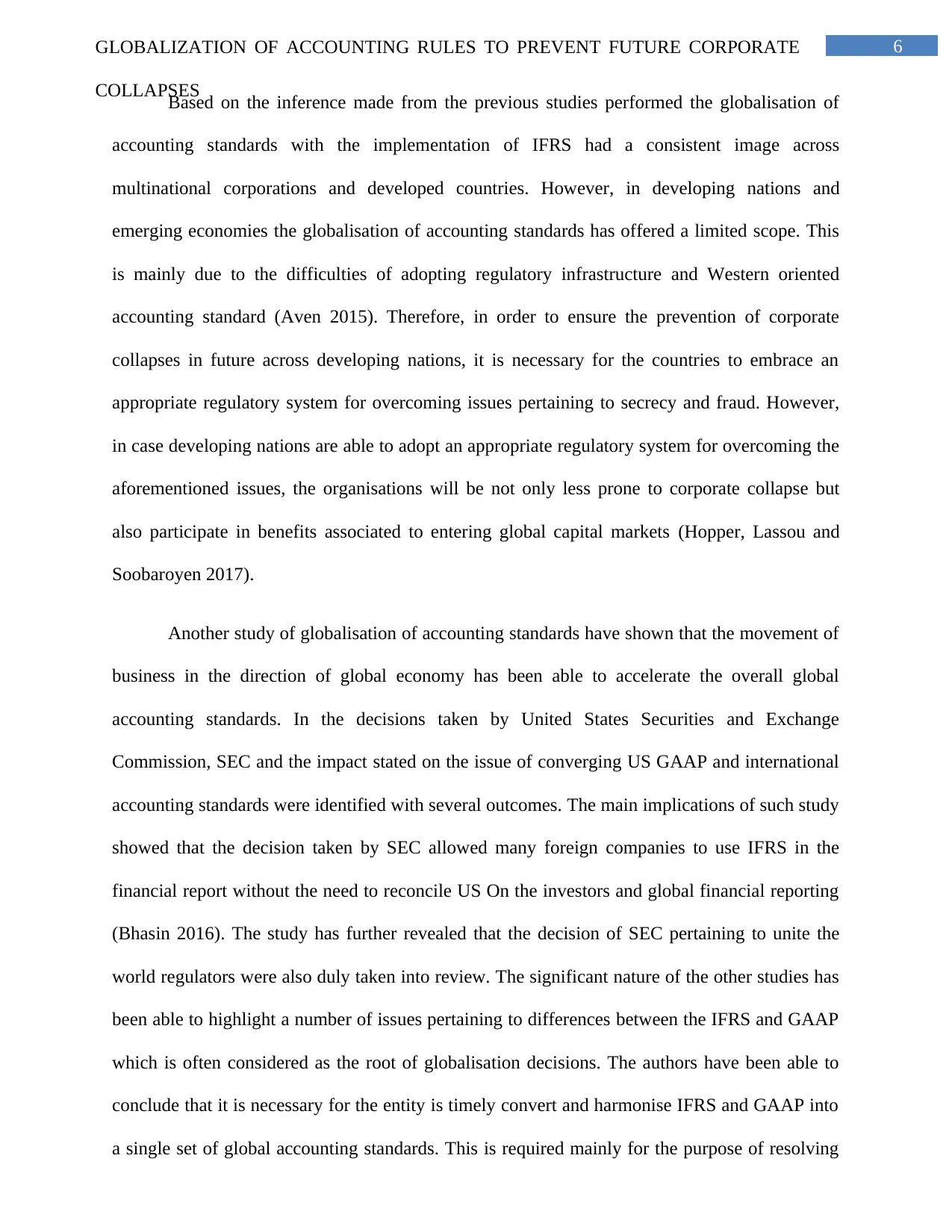
6GLOBALIZATION OF ACCOUNTING RULES TO PREVENT FUTURE CORPORATE
COLLAPSES
Based on the inference made from the previous studies performed the globalisation of
accounting standards with the implementation of IFRS had a consistent image across
multinational corporations and developed countries. However, in developing nations and
emerging economies the globalisation of accounting standards has offered a limited scope. This
is mainly due to the difficulties of adopting regulatory infrastructure and Western oriented
accounting standard (Aven 2015). Therefore, in order to ensure the prevention of corporate
collapses in future across developing nations, it is necessary for the countries to embrace an
appropriate regulatory system for overcoming issues pertaining to secrecy and fraud. However,
in case developing nations are able to adopt an appropriate regulatory system for overcoming the
aforementioned issues, the organisations will be not only less prone to corporate collapse but
also participate in benefits associated to entering global capital markets (Hopper, Lassou and
Soobaroyen 2017).
Another study of globalisation of accounting standards have shown that the movement of
business in the direction of global economy has been able to accelerate the overall global
accounting standards. In the decisions taken by United States Securities and Exchange
Commission, SEC and the impact stated on the issue of converging US GAAP and international
accounting standards were identified with several outcomes. The main implications of such study
showed that the decision taken by SEC allowed many foreign companies to use IFRS in the
financial report without the need to reconcile US On the investors and global financial reporting
(Bhasin 2016). The study has further revealed that the decision of SEC pertaining to unite the
world regulators were also duly taken into review. The significant nature of the other studies has
been able to highlight a number of issues pertaining to differences between the IFRS and GAAP
which is often considered as the root of globalisation decisions. The authors have been able to
conclude that it is necessary for the entity is timely convert and harmonise IFRS and GAAP into
a single set of global accounting standards. This is required mainly for the purpose of resolving
COLLAPSES
Based on the inference made from the previous studies performed the globalisation of
accounting standards with the implementation of IFRS had a consistent image across
multinational corporations and developed countries. However, in developing nations and
emerging economies the globalisation of accounting standards has offered a limited scope. This
is mainly due to the difficulties of adopting regulatory infrastructure and Western oriented
accounting standard (Aven 2015). Therefore, in order to ensure the prevention of corporate
collapses in future across developing nations, it is necessary for the countries to embrace an
appropriate regulatory system for overcoming issues pertaining to secrecy and fraud. However,
in case developing nations are able to adopt an appropriate regulatory system for overcoming the
aforementioned issues, the organisations will be not only less prone to corporate collapse but
also participate in benefits associated to entering global capital markets (Hopper, Lassou and
Soobaroyen 2017).
Another study of globalisation of accounting standards have shown that the movement of
business in the direction of global economy has been able to accelerate the overall global
accounting standards. In the decisions taken by United States Securities and Exchange
Commission, SEC and the impact stated on the issue of converging US GAAP and international
accounting standards were identified with several outcomes. The main implications of such study
showed that the decision taken by SEC allowed many foreign companies to use IFRS in the
financial report without the need to reconcile US On the investors and global financial reporting
(Bhasin 2016). The study has further revealed that the decision of SEC pertaining to unite the
world regulators were also duly taken into review. The significant nature of the other studies has
been able to highlight a number of issues pertaining to differences between the IFRS and GAAP
which is often considered as the root of globalisation decisions. The authors have been able to
conclude that it is necessary for the entity is timely convert and harmonise IFRS and GAAP into
a single set of global accounting standards. This is required mainly for the purpose of resolving
Paraphrase This Document
Need a fresh take? Get an instant paraphrase of this document with our AI Paraphraser
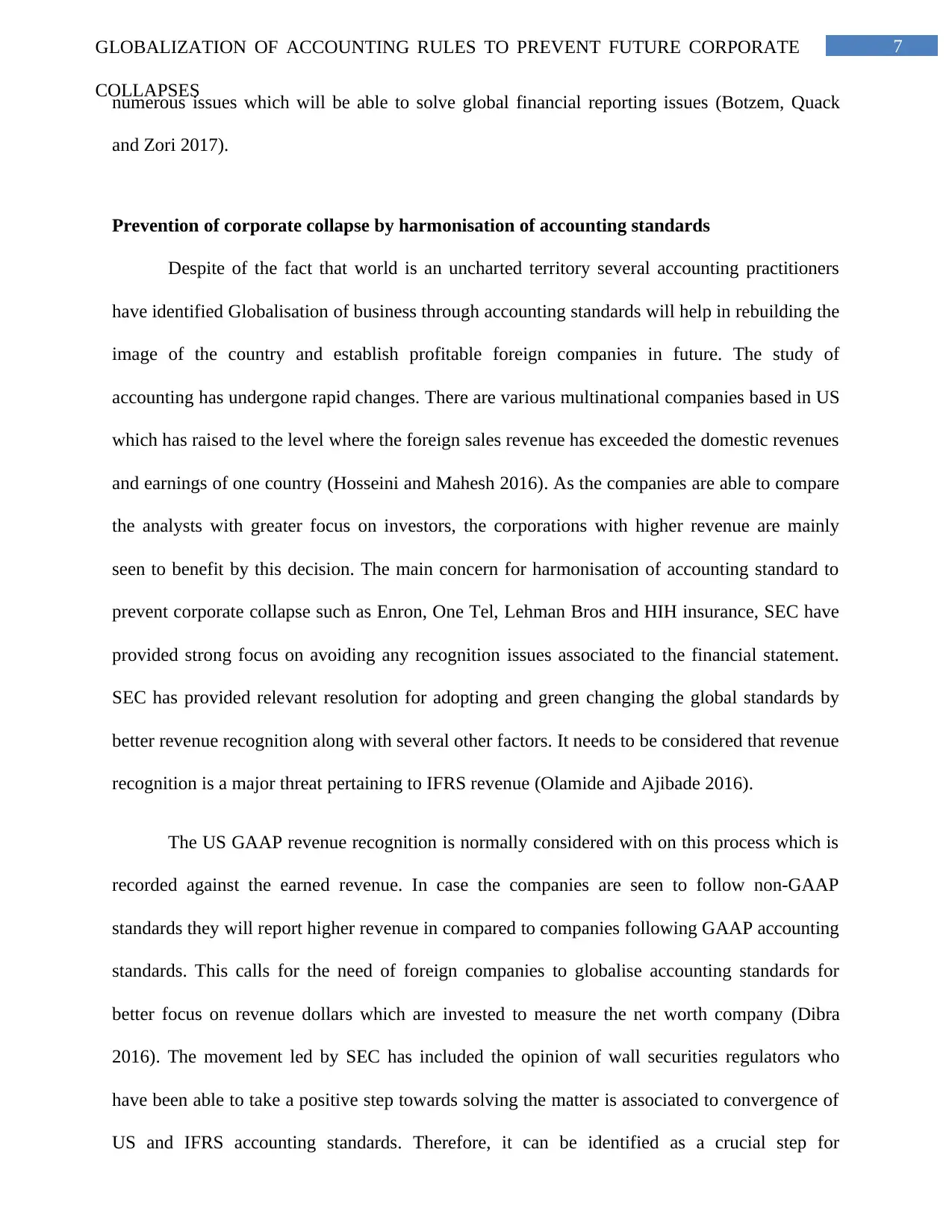
7GLOBALIZATION OF ACCOUNTING RULES TO PREVENT FUTURE CORPORATE
COLLAPSES
numerous issues which will be able to solve global financial reporting issues (Botzem, Quack
and Zori 2017).
Prevention of corporate collapse by harmonisation of accounting standards
Despite of the fact that world is an uncharted territory several accounting practitioners
have identified Globalisation of business through accounting standards will help in rebuilding the
image of the country and establish profitable foreign companies in future. The study of
accounting has undergone rapid changes. There are various multinational companies based in US
which has raised to the level where the foreign sales revenue has exceeded the domestic revenues
and earnings of one country (Hosseini and Mahesh 2016). As the companies are able to compare
the analysts with greater focus on investors, the corporations with higher revenue are mainly
seen to benefit by this decision. The main concern for harmonisation of accounting standard to
prevent corporate collapse such as Enron, One Tel, Lehman Bros and HIH insurance, SEC have
provided strong focus on avoiding any recognition issues associated to the financial statement.
SEC has provided relevant resolution for adopting and green changing the global standards by
better revenue recognition along with several other factors. It needs to be considered that revenue
recognition is a major threat pertaining to IFRS revenue (Olamide and Ajibade 2016).
The US GAAP revenue recognition is normally considered with on this process which is
recorded against the earned revenue. In case the companies are seen to follow non-GAAP
standards they will report higher revenue in compared to companies following GAAP accounting
standards. This calls for the need of foreign companies to globalise accounting standards for
better focus on revenue dollars which are invested to measure the net worth company (Dibra
2016). The movement led by SEC has included the opinion of wall securities regulators who
have been able to take a positive step towards solving the matter is associated to convergence of
US and IFRS accounting standards. Therefore, it can be identified as a crucial step for
COLLAPSES
numerous issues which will be able to solve global financial reporting issues (Botzem, Quack
and Zori 2017).
Prevention of corporate collapse by harmonisation of accounting standards
Despite of the fact that world is an uncharted territory several accounting practitioners
have identified Globalisation of business through accounting standards will help in rebuilding the
image of the country and establish profitable foreign companies in future. The study of
accounting has undergone rapid changes. There are various multinational companies based in US
which has raised to the level where the foreign sales revenue has exceeded the domestic revenues
and earnings of one country (Hosseini and Mahesh 2016). As the companies are able to compare
the analysts with greater focus on investors, the corporations with higher revenue are mainly
seen to benefit by this decision. The main concern for harmonisation of accounting standard to
prevent corporate collapse such as Enron, One Tel, Lehman Bros and HIH insurance, SEC have
provided strong focus on avoiding any recognition issues associated to the financial statement.
SEC has provided relevant resolution for adopting and green changing the global standards by
better revenue recognition along with several other factors. It needs to be considered that revenue
recognition is a major threat pertaining to IFRS revenue (Olamide and Ajibade 2016).
The US GAAP revenue recognition is normally considered with on this process which is
recorded against the earned revenue. In case the companies are seen to follow non-GAAP
standards they will report higher revenue in compared to companies following GAAP accounting
standards. This calls for the need of foreign companies to globalise accounting standards for
better focus on revenue dollars which are invested to measure the net worth company (Dibra
2016). The movement led by SEC has included the opinion of wall securities regulators who
have been able to take a positive step towards solving the matter is associated to convergence of
US and IFRS accounting standards. Therefore, it can be identified as a crucial step for
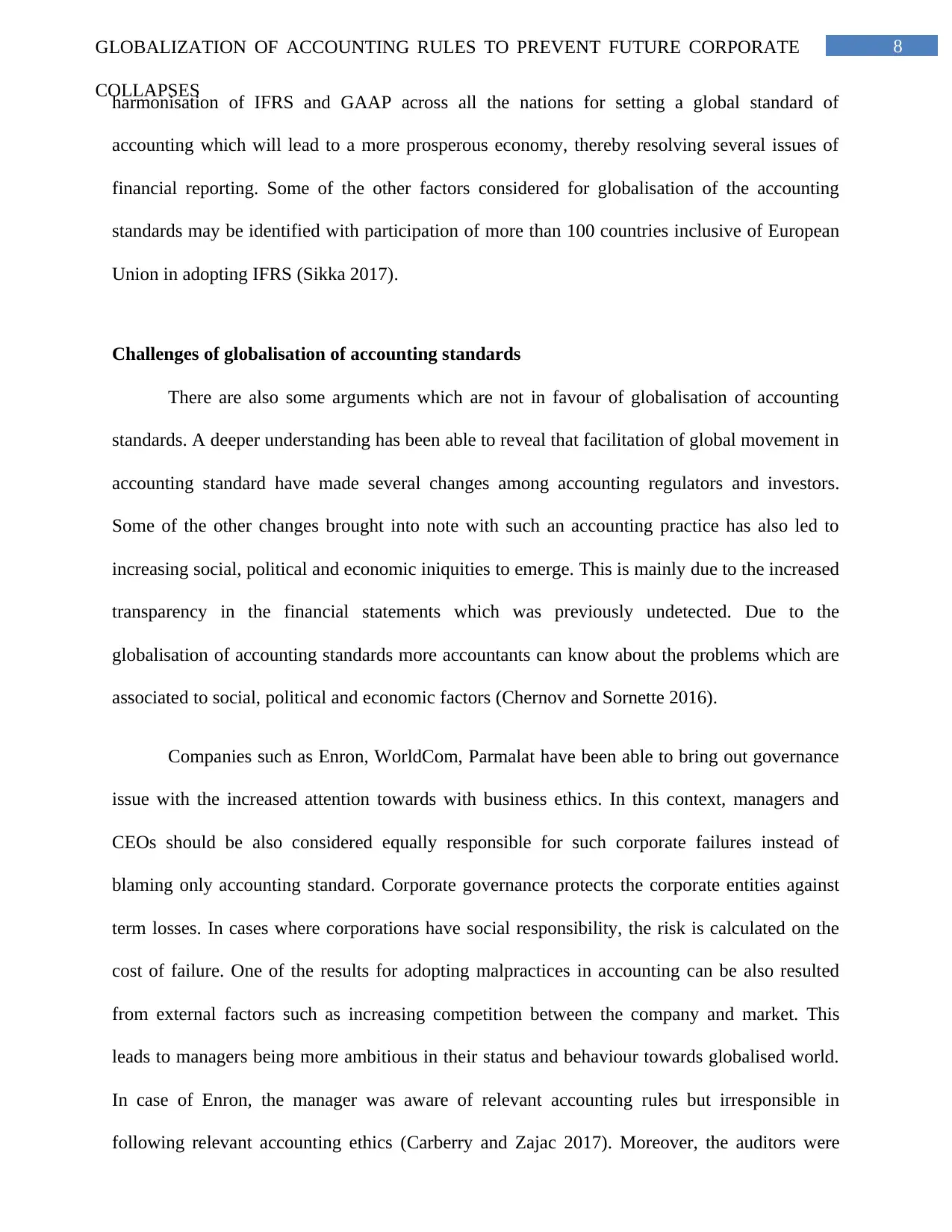
8GLOBALIZATION OF ACCOUNTING RULES TO PREVENT FUTURE CORPORATE
COLLAPSES
harmonisation of IFRS and GAAP across all the nations for setting a global standard of
accounting which will lead to a more prosperous economy, thereby resolving several issues of
financial reporting. Some of the other factors considered for globalisation of the accounting
standards may be identified with participation of more than 100 countries inclusive of European
Union in adopting IFRS (Sikka 2017).
Challenges of globalisation of accounting standards
There are also some arguments which are not in favour of globalisation of accounting
standards. A deeper understanding has been able to reveal that facilitation of global movement in
accounting standard have made several changes among accounting regulators and investors.
Some of the other changes brought into note with such an accounting practice has also led to
increasing social, political and economic iniquities to emerge. This is mainly due to the increased
transparency in the financial statements which was previously undetected. Due to the
globalisation of accounting standards more accountants can know about the problems which are
associated to social, political and economic factors (Chernov and Sornette 2016).
Companies such as Enron, WorldCom, Parmalat have been able to bring out governance
issue with the increased attention towards with business ethics. In this context, managers and
CEOs should be also considered equally responsible for such corporate failures instead of
blaming only accounting standard. Corporate governance protects the corporate entities against
term losses. In cases where corporations have social responsibility, the risk is calculated on the
cost of failure. One of the results for adopting malpractices in accounting can be also resulted
from external factors such as increasing competition between the company and market. This
leads to managers being more ambitious in their status and behaviour towards globalised world.
In case of Enron, the manager was aware of relevant accounting rules but irresponsible in
following relevant accounting ethics (Carberry and Zajac 2017). Moreover, the auditors were
COLLAPSES
harmonisation of IFRS and GAAP across all the nations for setting a global standard of
accounting which will lead to a more prosperous economy, thereby resolving several issues of
financial reporting. Some of the other factors considered for globalisation of the accounting
standards may be identified with participation of more than 100 countries inclusive of European
Union in adopting IFRS (Sikka 2017).
Challenges of globalisation of accounting standards
There are also some arguments which are not in favour of globalisation of accounting
standards. A deeper understanding has been able to reveal that facilitation of global movement in
accounting standard have made several changes among accounting regulators and investors.
Some of the other changes brought into note with such an accounting practice has also led to
increasing social, political and economic iniquities to emerge. This is mainly due to the increased
transparency in the financial statements which was previously undetected. Due to the
globalisation of accounting standards more accountants can know about the problems which are
associated to social, political and economic factors (Chernov and Sornette 2016).
Companies such as Enron, WorldCom, Parmalat have been able to bring out governance
issue with the increased attention towards with business ethics. In this context, managers and
CEOs should be also considered equally responsible for such corporate failures instead of
blaming only accounting standard. Corporate governance protects the corporate entities against
term losses. In cases where corporations have social responsibility, the risk is calculated on the
cost of failure. One of the results for adopting malpractices in accounting can be also resulted
from external factors such as increasing competition between the company and market. This
leads to managers being more ambitious in their status and behaviour towards globalised world.
In case of Enron, the manager was aware of relevant accounting rules but irresponsible in
following relevant accounting ethics (Carberry and Zajac 2017). Moreover, the auditors were
⊘ This is a preview!⊘
Do you want full access?
Subscribe today to unlock all pages.

Trusted by 1+ million students worldwide
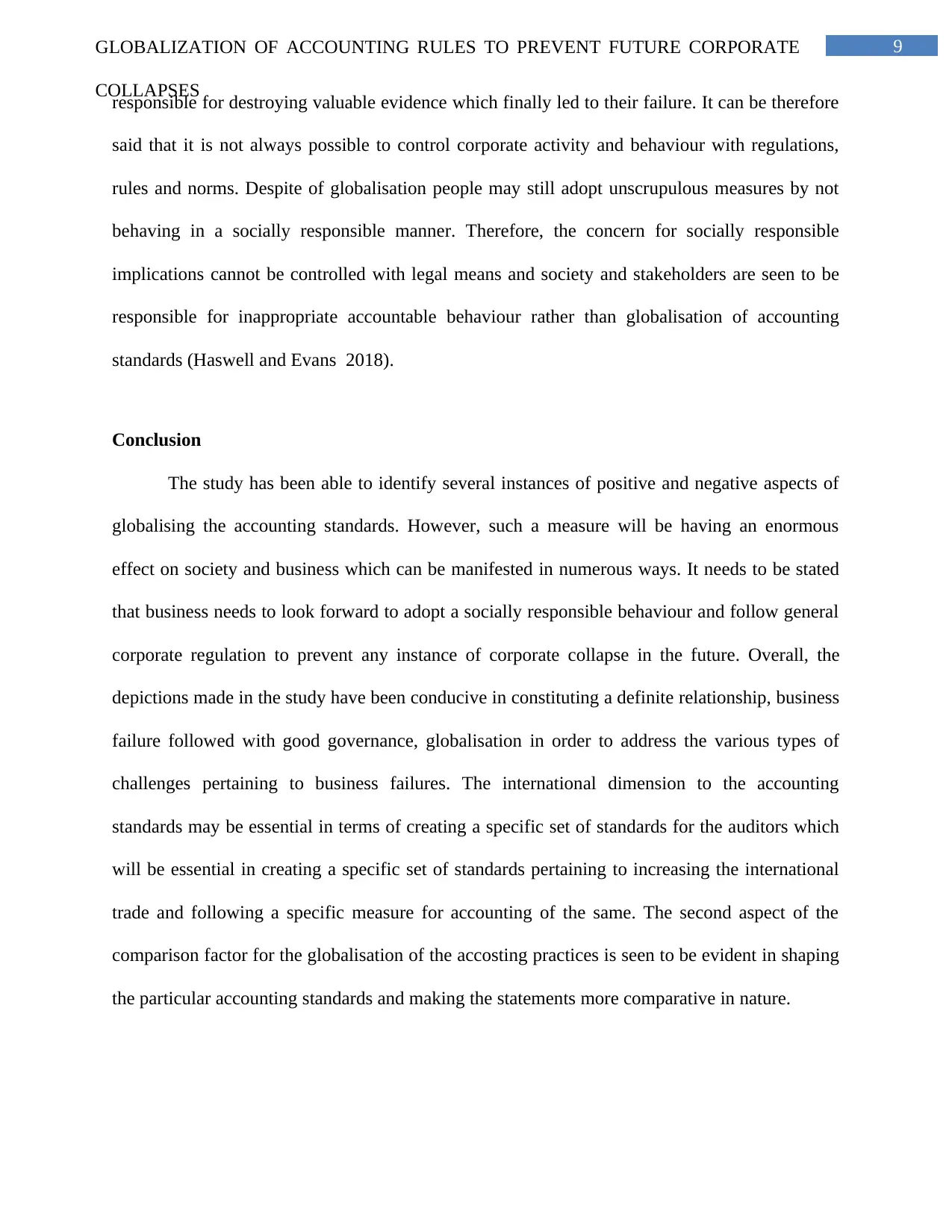
9GLOBALIZATION OF ACCOUNTING RULES TO PREVENT FUTURE CORPORATE
COLLAPSES
responsible for destroying valuable evidence which finally led to their failure. It can be therefore
said that it is not always possible to control corporate activity and behaviour with regulations,
rules and norms. Despite of globalisation people may still adopt unscrupulous measures by not
behaving in a socially responsible manner. Therefore, the concern for socially responsible
implications cannot be controlled with legal means and society and stakeholders are seen to be
responsible for inappropriate accountable behaviour rather than globalisation of accounting
standards (Haswell and Evans 2018).
Conclusion
The study has been able to identify several instances of positive and negative aspects of
globalising the accounting standards. However, such a measure will be having an enormous
effect on society and business which can be manifested in numerous ways. It needs to be stated
that business needs to look forward to adopt a socially responsible behaviour and follow general
corporate regulation to prevent any instance of corporate collapse in the future. Overall, the
depictions made in the study have been conducive in constituting a definite relationship, business
failure followed with good governance, globalisation in order to address the various types of
challenges pertaining to business failures. The international dimension to the accounting
standards may be essential in terms of creating a specific set of standards for the auditors which
will be essential in creating a specific set of standards pertaining to increasing the international
trade and following a specific measure for accounting of the same. The second aspect of the
comparison factor for the globalisation of the accosting practices is seen to be evident in shaping
the particular accounting standards and making the statements more comparative in nature.
COLLAPSES
responsible for destroying valuable evidence which finally led to their failure. It can be therefore
said that it is not always possible to control corporate activity and behaviour with regulations,
rules and norms. Despite of globalisation people may still adopt unscrupulous measures by not
behaving in a socially responsible manner. Therefore, the concern for socially responsible
implications cannot be controlled with legal means and society and stakeholders are seen to be
responsible for inappropriate accountable behaviour rather than globalisation of accounting
standards (Haswell and Evans 2018).
Conclusion
The study has been able to identify several instances of positive and negative aspects of
globalising the accounting standards. However, such a measure will be having an enormous
effect on society and business which can be manifested in numerous ways. It needs to be stated
that business needs to look forward to adopt a socially responsible behaviour and follow general
corporate regulation to prevent any instance of corporate collapse in the future. Overall, the
depictions made in the study have been conducive in constituting a definite relationship, business
failure followed with good governance, globalisation in order to address the various types of
challenges pertaining to business failures. The international dimension to the accounting
standards may be essential in terms of creating a specific set of standards for the auditors which
will be essential in creating a specific set of standards pertaining to increasing the international
trade and following a specific measure for accounting of the same. The second aspect of the
comparison factor for the globalisation of the accosting practices is seen to be evident in shaping
the particular accounting standards and making the statements more comparative in nature.
Paraphrase This Document
Need a fresh take? Get an instant paraphrase of this document with our AI Paraphraser
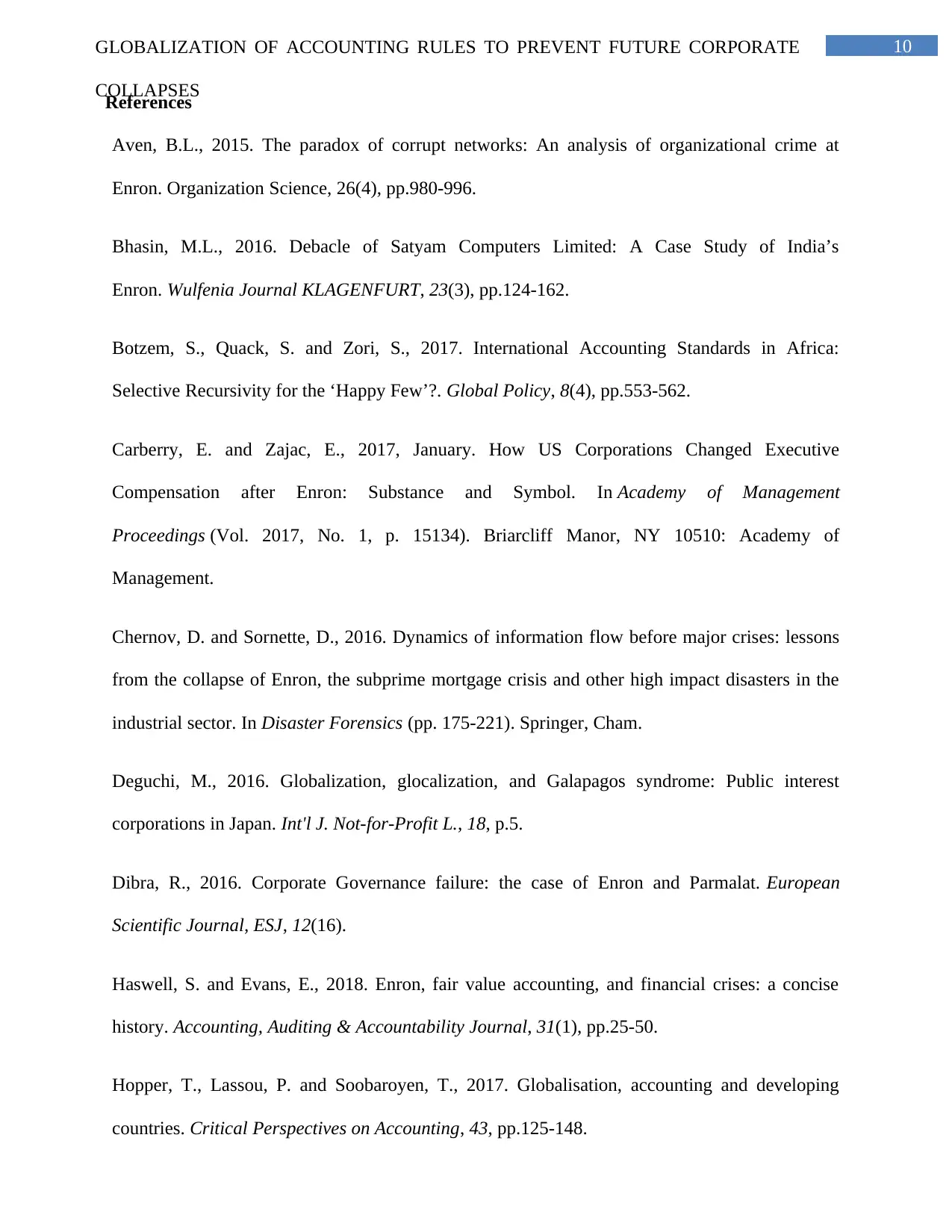
10GLOBALIZATION OF ACCOUNTING RULES TO PREVENT FUTURE CORPORATE
COLLAPSES
References
Aven, B.L., 2015. The paradox of corrupt networks: An analysis of organizational crime at
Enron. Organization Science, 26(4), pp.980-996.
Bhasin, M.L., 2016. Debacle of Satyam Computers Limited: A Case Study of India’s
Enron. Wulfenia Journal KLAGENFURT, 23(3), pp.124-162.
Botzem, S., Quack, S. and Zori, S., 2017. International Accounting Standards in Africa:
Selective Recursivity for the ‘Happy Few’?. Global Policy, 8(4), pp.553-562.
Carberry, E. and Zajac, E., 2017, January. How US Corporations Changed Executive
Compensation after Enron: Substance and Symbol. In Academy of Management
Proceedings (Vol. 2017, No. 1, p. 15134). Briarcliff Manor, NY 10510: Academy of
Management.
Chernov, D. and Sornette, D., 2016. Dynamics of information flow before major crises: lessons
from the collapse of Enron, the subprime mortgage crisis and other high impact disasters in the
industrial sector. In Disaster Forensics (pp. 175-221). Springer, Cham.
Deguchi, M., 2016. Globalization, glocalization, and Galapagos syndrome: Public interest
corporations in Japan. Int'l J. Not-for-Profit L., 18, p.5.
Dibra, R., 2016. Corporate Governance failure: the case of Enron and Parmalat. European
Scientific Journal, ESJ, 12(16).
Haswell, S. and Evans, E., 2018. Enron, fair value accounting, and financial crises: a concise
history. Accounting, Auditing & Accountability Journal, 31(1), pp.25-50.
Hopper, T., Lassou, P. and Soobaroyen, T., 2017. Globalisation, accounting and developing
countries. Critical Perspectives on Accounting, 43, pp.125-148.
COLLAPSES
References
Aven, B.L., 2015. The paradox of corrupt networks: An analysis of organizational crime at
Enron. Organization Science, 26(4), pp.980-996.
Bhasin, M.L., 2016. Debacle of Satyam Computers Limited: A Case Study of India’s
Enron. Wulfenia Journal KLAGENFURT, 23(3), pp.124-162.
Botzem, S., Quack, S. and Zori, S., 2017. International Accounting Standards in Africa:
Selective Recursivity for the ‘Happy Few’?. Global Policy, 8(4), pp.553-562.
Carberry, E. and Zajac, E., 2017, January. How US Corporations Changed Executive
Compensation after Enron: Substance and Symbol. In Academy of Management
Proceedings (Vol. 2017, No. 1, p. 15134). Briarcliff Manor, NY 10510: Academy of
Management.
Chernov, D. and Sornette, D., 2016. Dynamics of information flow before major crises: lessons
from the collapse of Enron, the subprime mortgage crisis and other high impact disasters in the
industrial sector. In Disaster Forensics (pp. 175-221). Springer, Cham.
Deguchi, M., 2016. Globalization, glocalization, and Galapagos syndrome: Public interest
corporations in Japan. Int'l J. Not-for-Profit L., 18, p.5.
Dibra, R., 2016. Corporate Governance failure: the case of Enron and Parmalat. European
Scientific Journal, ESJ, 12(16).
Haswell, S. and Evans, E., 2018. Enron, fair value accounting, and financial crises: a concise
history. Accounting, Auditing & Accountability Journal, 31(1), pp.25-50.
Hopper, T., Lassou, P. and Soobaroyen, T., 2017. Globalisation, accounting and developing
countries. Critical Perspectives on Accounting, 43, pp.125-148.
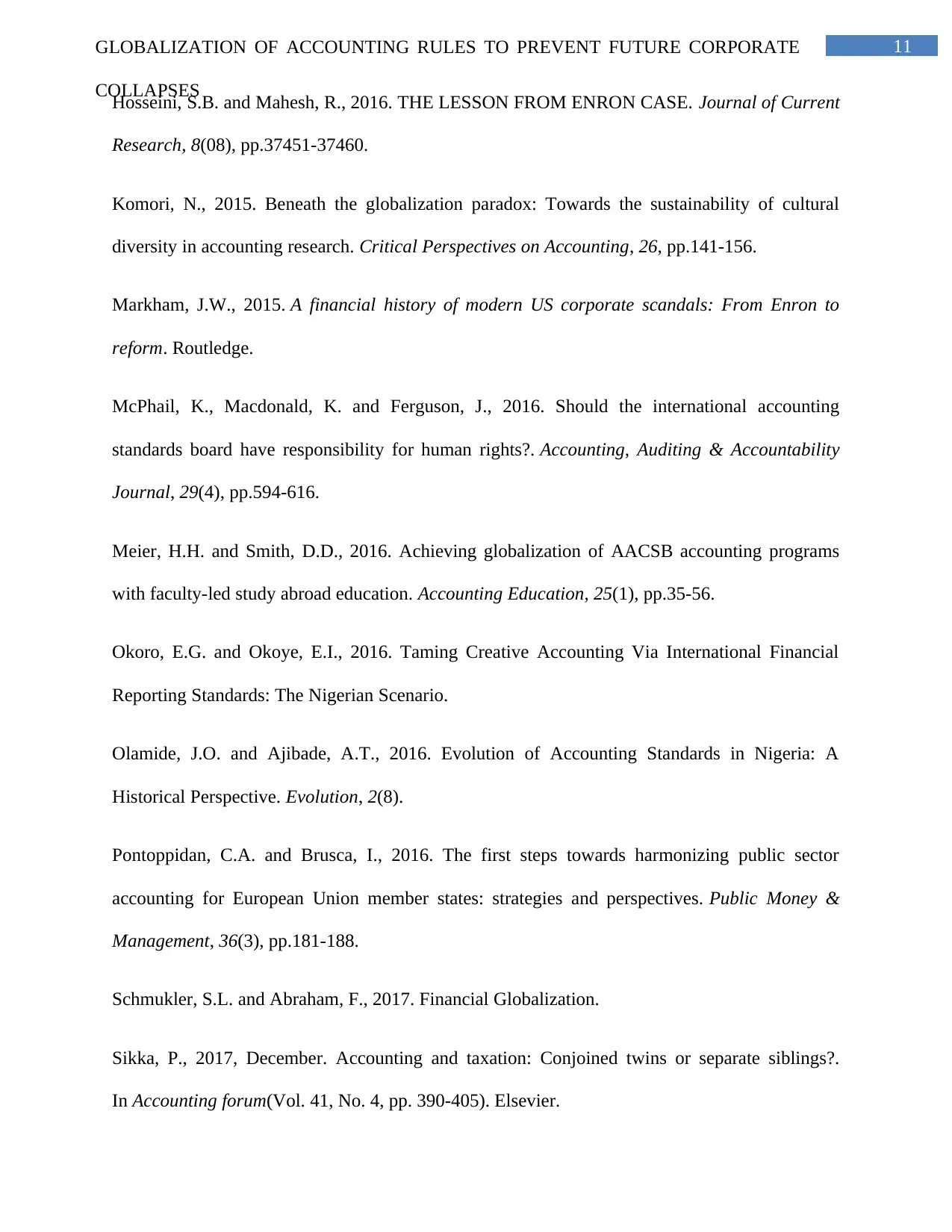
11GLOBALIZATION OF ACCOUNTING RULES TO PREVENT FUTURE CORPORATE
COLLAPSES
Hosseini, S.B. and Mahesh, R., 2016. THE LESSON FROM ENRON CASE. Journal of Current
Research, 8(08), pp.37451-37460.
Komori, N., 2015. Beneath the globalization paradox: Towards the sustainability of cultural
diversity in accounting research. Critical Perspectives on Accounting, 26, pp.141-156.
Markham, J.W., 2015. A financial history of modern US corporate scandals: From Enron to
reform. Routledge.
McPhail, K., Macdonald, K. and Ferguson, J., 2016. Should the international accounting
standards board have responsibility for human rights?. Accounting, Auditing & Accountability
Journal, 29(4), pp.594-616.
Meier, H.H. and Smith, D.D., 2016. Achieving globalization of AACSB accounting programs
with faculty-led study abroad education. Accounting Education, 25(1), pp.35-56.
Okoro, E.G. and Okoye, E.I., 2016. Taming Creative Accounting Via International Financial
Reporting Standards: The Nigerian Scenario.
Olamide, J.O. and Ajibade, A.T., 2016. Evolution of Accounting Standards in Nigeria: A
Historical Perspective. Evolution, 2(8).
Pontoppidan, C.A. and Brusca, I., 2016. The first steps towards harmonizing public sector
accounting for European Union member states: strategies and perspectives. Public Money &
Management, 36(3), pp.181-188.
Schmukler, S.L. and Abraham, F., 2017. Financial Globalization.
Sikka, P., 2017, December. Accounting and taxation: Conjoined twins or separate siblings?.
In Accounting forum(Vol. 41, No. 4, pp. 390-405). Elsevier.
COLLAPSES
Hosseini, S.B. and Mahesh, R., 2016. THE LESSON FROM ENRON CASE. Journal of Current
Research, 8(08), pp.37451-37460.
Komori, N., 2015. Beneath the globalization paradox: Towards the sustainability of cultural
diversity in accounting research. Critical Perspectives on Accounting, 26, pp.141-156.
Markham, J.W., 2015. A financial history of modern US corporate scandals: From Enron to
reform. Routledge.
McPhail, K., Macdonald, K. and Ferguson, J., 2016. Should the international accounting
standards board have responsibility for human rights?. Accounting, Auditing & Accountability
Journal, 29(4), pp.594-616.
Meier, H.H. and Smith, D.D., 2016. Achieving globalization of AACSB accounting programs
with faculty-led study abroad education. Accounting Education, 25(1), pp.35-56.
Okoro, E.G. and Okoye, E.I., 2016. Taming Creative Accounting Via International Financial
Reporting Standards: The Nigerian Scenario.
Olamide, J.O. and Ajibade, A.T., 2016. Evolution of Accounting Standards in Nigeria: A
Historical Perspective. Evolution, 2(8).
Pontoppidan, C.A. and Brusca, I., 2016. The first steps towards harmonizing public sector
accounting for European Union member states: strategies and perspectives. Public Money &
Management, 36(3), pp.181-188.
Schmukler, S.L. and Abraham, F., 2017. Financial Globalization.
Sikka, P., 2017, December. Accounting and taxation: Conjoined twins or separate siblings?.
In Accounting forum(Vol. 41, No. 4, pp. 390-405). Elsevier.
⊘ This is a preview!⊘
Do you want full access?
Subscribe today to unlock all pages.

Trusted by 1+ million students worldwide
1 out of 13
Related Documents
Your All-in-One AI-Powered Toolkit for Academic Success.
+13062052269
info@desklib.com
Available 24*7 on WhatsApp / Email
![[object Object]](/_next/static/media/star-bottom.7253800d.svg)
Unlock your academic potential
Copyright © 2020–2026 A2Z Services. All Rights Reserved. Developed and managed by ZUCOL.





